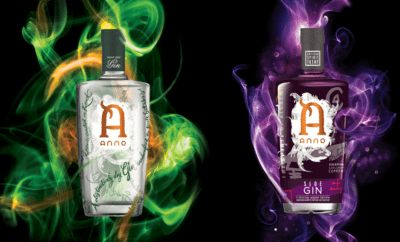World Gin Day: Let The Imbibing & Investing ‘Be-Gin’
Ahead of ‘World Gin Day’ this year on 8 June, award-winning UK online broker, The Share Centre, has taken a look at how an investment of £1,000 in household-name gin brands could have returned a refreshingly nice profit of £172 since last year. Not a bad yield at 17.2% per annum all things considered.
World Gin Day on 8 June is a global celebration of all things gin. And, since 2009 people have been getting together all around the world with an excuse to drink their favourite gin-themed tipple. So, before you get the gin and tonics in at the tennis club, let’s delve a bit deeper in the world of gin.
Gin, also knicknamed ‘Mother’s Ruin’, is a distilled alcoholic drink that derives its predominant flavour from juniper berries (Juniperus communis). It is one of the broadest categories of spirits, all of various origins, styles, and flavour profiles, that revolve around juniper as a common ingredient.
Developed based on the older Dutch liquor, jenever, which got Anglicised to ‘ginever’ and then to ‘gin’, it became popular in Britain (particularly in London) when William of Orange became King William III of England. One theory on the etymology of the term ‘Dutch courage’, was that it jenever (or Dutch gin) was used by English soldiers for its calming effects before battle in Anglo-Dutch wars of the mid-1600s.
From its earliest origins in the Middle Ages, the drink has evolved from a herbal medicine to an object of commerce in the spirits industry. Today it is produced in subtly different ways, from a wide range of herbal ingredients, which give rise to a number of distinct styles and brands. But commonly consumed mixed with tonic water.
During the ‘Gin Craze’ in the 18th century there was almost a gin shop or distillery on every corner of The City in London. This all came to an end following the passing of the Gin Act 1751 and very few distilleries survived.
That is until 2012, when The City of London Distillery brought gin distilling back to The City following an absence of some 200 years. Located off Fleet Street (22-24 Bride Lane, EC4), they have won ‘Double-Gold’ at the San Francisco World Spirits Competition this year and a Gold Award for Christopher Wren Gin in the International Wine & Spirit Competition.
World Gin Day 2019
Given the popularity of the spirit and the day’s festivities around World Gin Day resulted in a four-day festival being established in London last year. This year it has expanded into a five-day festival and opens up a chosen selection of London’s greatest bars to gin enthusiasts who can enjoy bespoke £6 gin cocktails with a free digital pass.
The combined sales for 2018 of UK gin, both within the UK and overseas surpassed the £2.5 billion mark. Incredible as it seems, Britain now exports more gin around the world than it does beef and beer. And, with the gin industry constantly evolving and new innovations coming to market, why not get involved?
Diageo and Pernod Ricard are both publicly listed alcoholic beverages companies. Diageo produces brands such as Smirnoff, Johnnie Walker and Tanqueray, while Pernod Ricard’s stable is produces brands like Absolut Vodka, Beefeater and Malibu.
Since World Gin Day last year both of these brand powerhouses have seen notable improvements in the share prices, returning 11.09% and 19.25%, respectively. For all those gin and tonic lovers The Share Centre, a member firm the London Stock Exchange, has also taken a look at how British soft drink producer, Britvic, has fared over the same period – returning 18%.
Thomas Rosser, investment research analyst at The Share Centre, commenting said: “Investing does not have to be boring. In fact, it is a great way of setting goals – whether that is for small targets such as enjoying gin with friends or life-milestone goals such as saving for a house or retirement. Realising the value of letting your money do the work for you is crucial and allows powers such as compounding to take control.”
Investment Performance Over Past Year
In terms of investment returns and performance, if one had invested £1,000 split equally between Diageo, Pernod Ricard and Britvic stocks on 8 June 2018, this would resulted a tidy £172 profit. That translates into a return of 17.2% and £231 more than you would have made had you invested over the same time horizon in the FTSE All Share, a capitalisation-weighted index that comprises around 600 of more than 2,000 companies traded on the London Stock Exchange.
But to put that return into perspective, with this additional cash you would be able to purchase either nine bottles of Gordon’s or seven bottles of Tanqueray, both of which are produced by Diageo.
Alternatively, if Pernod Ricard’s brands are more to your taste, then you could have purchased seven bottles of Beefeater Gin. Or perhaps have exchanged it for 11 tickets for the Beefeater Gin’s distillery tour in London, or indeed four exclusive VIP experiences at the very same location.
Finally, if you would prefer to bask in the June sunshine – in between some showers – and sip on the nation’s favourite spirit accompanied with a carbonated beverage, then your profits would allow you to snap up 34 gin and tonics, based on an average £5 unit price across the UK.
Some sharp investors may have noticed that The Share Centre failed so far to mention Fever-Tree, the AIM-listed company and producer of drink mixers. The previously effervescent stock has had a bit of a tough year on the markets, up a mere 1.09% over the period examined.
Fever-Tree
But even if Fever-Tree had been included in a hypothetical £1,000 investment (split equally) alongside Diageo, Pernod Ricard and Britvic on the main market of the London Stock Exchange, it would have still netted you a profit, but less so – coming in at a penny short of £137.
Still, a healthy return considering what one would get versus a deposit account in your average high street bank. That said, shares in Fever Tree are well down from their 52-week high of £41.20 (versus 52-wk low of £21.06), trading at the close of play on Friday, 7 June, at £26.53 each and on a Price-Earnings (P/E) ratio just shy of a heady 50 times. So, around a third (35.6%) off their high over the last 12 months.
Diageo
As to the stocks in these companies, in recent years Diageo has focused more on building its spirits brands, especially in developing markets such as India and Turkey, and increasing its interests in growing categories such as gin and tequila.
Interim results in February came in towards the top end of forecasts and the market was pleased to see that growth was broad-based across many regions. Sales rose 6% and operating profits were up 11% along with a good increase in cash flow. The shares as of Friday, 7 June 2019, were trading at a tad over £34 a pop (52-wk high £34.12/52-wk low £25.13) and on a P/E ratio of almost 32 times.
There was also a further £660 million boost to its already large share buyback programme. Another update in May was confident in its tone and reiterated guidance to 2022 for organic net sales growth towards the upper end of mid-single digit range.
The Share Centre continues to recommend a ‘Buy’ on Diageo due to the strength of its brands, resilient sales in the U.S. market, citing “excellent long-term prospects” for emerging market territories and the support provided by good cash flow and the large share buyback programme.
Pernod Ricard
With the current buoyant demand for spirits, and especially gin, Pernod Ricard, is well positioned to deliver at the upper end of its sales targets. This will be driven by strong emerging-market demand, which constitutes 39% of sales, with 50% derived in China and India.
“Shares do currently trade at a premium versus the European beverages sector, however, the combination of strong organic sales growth and best-in-class earnings per share (EPS) growth relative to its peers can justify this,” noted Rosser at The Share Centre.
“While we don’t hold a formal recommendation on the stock; solid fundamentals, comfortable margins and potential for supply-chain efficiencies generate a credible investment case for the stock.”
Britvic
Britvic Plc supplies, manufactures and markets a wide range of own brand soft drinks, as well distributing drinks manufactured by other companies. Second only to Coca-Cola in volume sales in Britain, Britvic also remains committed to international expansion, recently having tapped into the sixth largest soft drinks market in the world, namely Brazil.
Investment research analyst Rosser at The Share Centre posited: “Despite a number of operational headwinds over the last year and a half, Britvic has continued to garner growth in profits and deliver in-line with expectations at a minimum. Strong innovation capabilities and an attractive product offering should allow gradual improvement in sales growth going forward, followed by improving margins.”
The Share Centre does not presently have a formal stock recommendation on Britvic, but the fact that it trades on a c.30% discount to EU staples, and looks on track to deliver further earnings growth over the coming year means the stock provides a “good opportunity” for investors according to the brokerage firm.
Shares in the listed company closed on Friday, 7 June, at £9.20 each (versus 52-wk high £9.68/52-wk low £7.40) and on a P/E ratio of almost 20.5 times.
While there are Gin Day events in the London area, Leeds, Liverpool and Oxford to name a few cities across the UK, the event is also celebrated around the globe from Prague, Czech Republic, to Singapore, Tokyo and Sydney amongst other places.
For more information of World Gin Day see this link: https://worldginday.com/. The Share Centre’s website can be accessed via: www.share.com.








